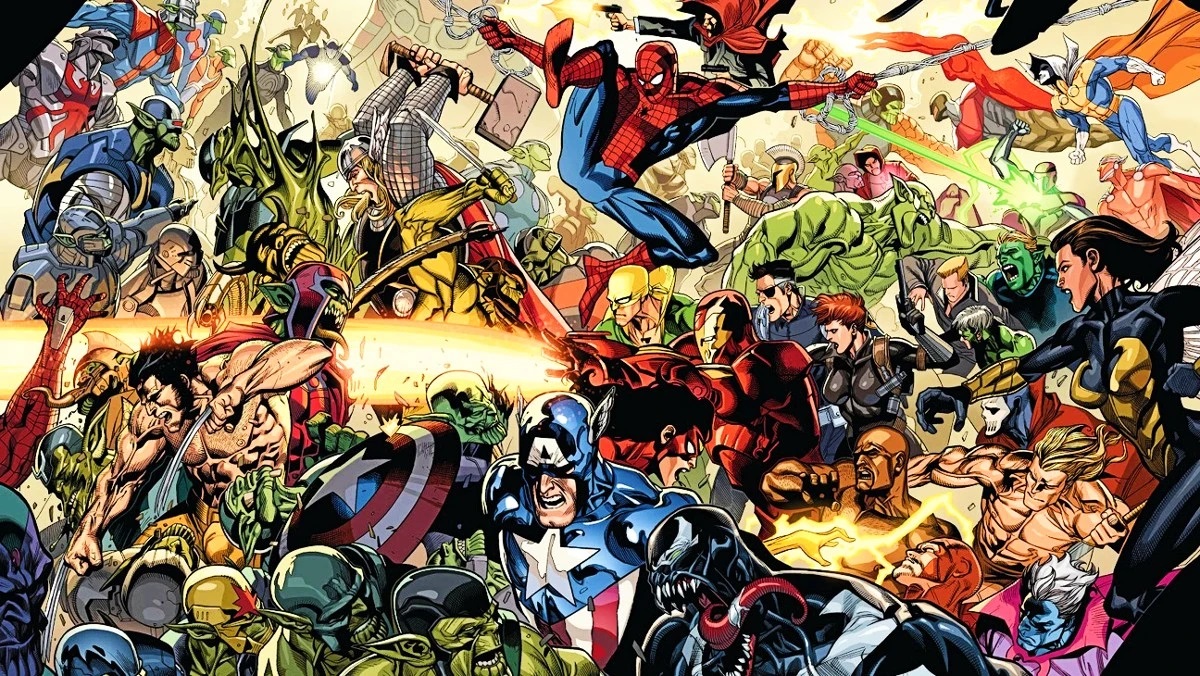“They already didn’t know who to trust.”
That’s what a shapeshifting alien member of the Skrull Empire, posing as Spider-Woman, tells a distraught Iron Man after he learns the Skrulls have taken over Earth after posing as humans – and Avengers – for an unknown amount of time. Their conversation touches on the Skrulls’ centuries-long observation of the human race, a species that brutally make themselves at home and subjugates the indigenous populace for its own comforts. As the Skrull Spider-Woman says, “We know they’d have done the same. They have done the same.”
In 2023, Marvel’s Secret Invasion by writer Brian Michael Bendis and artist Lenil Francis Yu can be a chilling read. Published 15 years ago as the publisher’s big crossover event of 2008, the eight-issue series entertains as a rousing epic with a novel premise. Shapeshifting aliens known as Skrulls hide throughout Earth, ready to carry out plans to take over the planet when we’re at our most defenseless.
What gives Secret Invasion real power, though, is its abstract reinterpretation of late-aughts anxieties – and 15 years later, how prescient it was about imminent political division and paranoia. Amidst the financial crisis, the War on Terror, and an election cycle that started a long serpentine path to today’s neo-conservatism, Secret Invasion had passing resemblances of brilliance tucked away in the safety of a nonsensical Marvel superhero event. But now in 2023, long into an era when Trump-ism remains an inescapable hostile force, the whiz-bang splash pages that bombard Secret Invasion obscures its most provocative ideas: That monsters aren’t just embedded in our lives, but they have been here longer than we realize.
Secret Invasion arrives this week on Disney+ in a live-action limited series adaptation starring Samuel L. Jackson, back in his Marvel movie role as Nick Fury. Following Avengers: Endgame, Fury is a liaison between mankind and a society of refugee Skrulls. When a more dogmatic sect of Skrulls seek to occupy Earth, Fury embarks on a dangerous mission to thwart their plans.
The original comic book hardly resembles its TV version. While the show evokes a vibe that mixes The X-Files with The Americans, the comic strove for something more akin to vintage pulp sci-fi – think War of the Worlds and Invasion of the Body Snatchers – with modern superhero conventions. Like the more buzzworthy Civil War two years prior, Secret Invasion is packed wall-to-wall with superheroes, only now some are Skrulls. This not only gave Marvel fans a reason to keep up with the series, but as a cautionary tale, it illustrated how easily our defenses can be penetrated when the wrong wolves wear the right sheep’s clothing.
Time has been kind to Secret Invasion. It deserves critical recognition in comics literature, even if it doesn’t deserve the same reverence as transgressive titles like Watchmen and The Dark Knight Returns, nor a place in classrooms like Maus. But Secret Invasion is better than anyone may remember it, being a propulsive read that pleases the senses while being surprisingly insightful about mankind’s collective arrogance being among our greatest failings.
So much of what makes Secret Invasion worthwhile are its two main artists who deliver the goods. Brian Michael Bendis is one of the industry’s most renowned writers for a reason, having long proven his instinct towards what makes mainstream comics work even if he rarely makes it sublime. Lenil Francis Yu is similarly an impressive artist who brings a distinctly masculine edge to the page, though it’s in his close-up portraits of expressive faces – faces of fear, rage, remorse, and determination – that make his panels all the more visceral. (Though whatever goodwill he fosters is balanced out by his uncomfortable gazes at the female form, namely Spider-Woman’s.) These elements swirl into a sweeping saga that still hits over a decade later.
But the book’s timely emergence is what lends it terrifying potency. In those dog days of summer 2008 when Secret Invasion was hitting shelves, the burst of the U.S. housing bubble made it easy for millions to subscribe to baseless conspiracy theories about what went wrong. In a 2013 article for Scientific American, author Sander van der Linden wrote that conspiracy theories are funneled from “feelings of powerlessness and uncertainty.” It’s no coincidence that that is exactly what happened in the wake of the ‘08 crisis.
Let’s acknowledge that it’s maybe just coincidence how much Marvel appears to flirt with conspiracy iconography in Secret Invasion, namely the borderline anti-Semitic trope of lizard people conspiracies. Planning for event comics at the Big Two happens long in advance, and as mentioned before, it is mostly a play on classic sci-fi thriller tropes. But this only allows Secret Invasion to come off as more brilliant than anyone intended. That Secret Invasion is an amalgamated collection of fringe ideas all in the pursuit of a few concentrated themes – fear of ourselves and of our neighbor, and a loss in control – is impressive even if its creators didn’t know what they were doing. That it is a compulsive page-turner that demands attention even when better comics are on the shelf is no small feat, either.
Even now when it’s a Disney+ series, it’s easy to discount Secret Invasion. Regardless of when you picked it up, be it in 2008 or in 2023, the book entertains as solid Marvel fare while touching transcendence as our worlds become increasingly unrecognizable, but Secret Invasion isn’t necessarily about how much aliens succeed in mimicking us to destroy us. It doesn’t take any effort at all for our apocalypse to originate from within.
